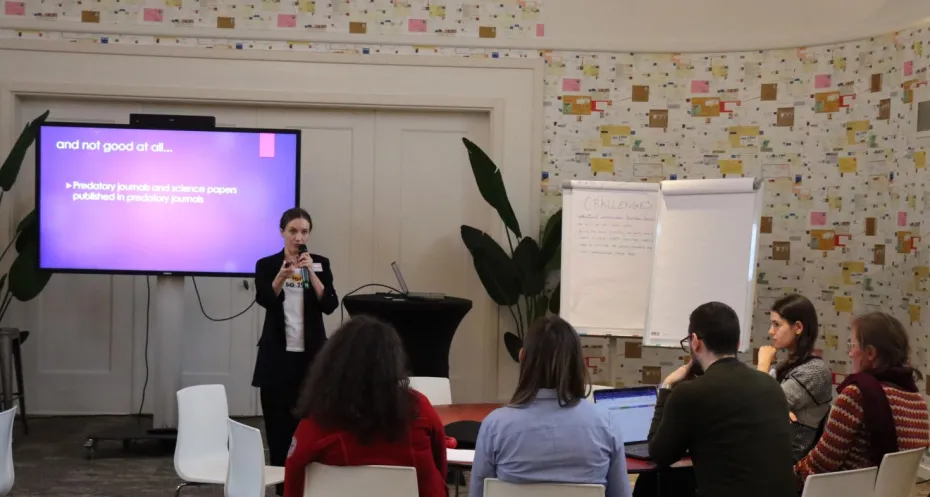Over 30 European journalists connect and exchange knowledge in The Hague

As Free Press Unlimited we see a need to accelerate collaboration of European journalists across borders. Therefore we coordinated the very first meeting of the E³J Network of Networks in The Hague on February 14. As a result over 30 journalists and journalism network directors and coordinators from all over Europe came together to discuss challenges and opportunities, and learn from each other.
This first meeting of our European Excellence Exchange in Journalism Network of Networks (E³J Network of Networks) brings together active European journalism networks working with a collaborative mindset. Free Press Unlimited aims to promote and multiply journalistic partnerships in Europe with this new platform and information hub to make them more salient and interconnected with other like-minded initiatives.
“I'm thrilled to see such a diverse group of journalists from across Europe joining us. Thrilled because this is exactly where we as Free Press Unlimited believe in and stand for. More solidarity among journalists, pluralism in journalism, exchanging and sharing experiences,” says Ruth Kronenburg, Executive Director of Free Press Unlimited in her opening speech.
The network event also marks the official launch of the Directory of European Journalism Networks, as part of the E³J project, funded by the European Union. The Directory is a database of European collaborative journalism networks, featuring over 40 networks, of which many representatives joined the event to meet in person.
The event offered many interesting panels, presentations and collaborative working sessions on diverse topics marking the challenges and benefits of cross-border journalism, and also highlighted the experiences from journalists who have published collaborative stories through subgrants provided by the E3J project. It brought together a diverse group of journalists and media managers, with various kinds of expertise, each representing or having previously worked with journalism networks in Europe. It emphasised the need to connect networks and their key facilitators to each other, and also created a sharing environment open to both more established and newer networks alike.
Many of the discussion topics were chosen by journalists from the represented networks, and facilitated by them, to ensure the relevance of the agenda as well as the angle from which the topics were approached. Here are a few of them:
Role of fixers
When working cross border, journalists are often in need of a fixer, someone who knows the local history and context, and can connect you with reliable sources. One session presented by Pierluigi Bizzini from the FADA Collective highlighted the importance of fixers, as well as the power imbalance that often happens between fixers and the big media outlets they work for and the negative impact it can have. Fixers are often overlooked, even though they are essential to the making of a good journalistic story. “I think we should regard fixers as journalists, so they can also receive the same treatment and protection,” states one of the participants. Another proposes that it is important to raise awareness on the role and importance of fixers, and suggests that adding them in the byline of articles could be a first step.
Freedom of information requests
“Information travels cross border, so use a Freedom of Information (FOI) request to get it!”, it says on the take away board after the session on how to use strategic FOI requests. Collaborating cross border can be of great value when it comes to accessing specific information. The laws around FOI requests can differ per country. For example, in some countries you are not able to legally request information from NGOs, but in others you can. So it can be very helpful to connect with journalists from other countries where different rules apply to get your information.
Or as Nico Schmidt from Investigate Europe, presenter of the session, says: “Don’t get stuck if national FOI law doesn’t work out, but try it in another country!”
Factchecking and science reporting
“My job is to try to destroy the journalist’s work,” says journalist and factchecker Marija Vucic who presents the session ‘How not to frustrate your factchecker’. She adds: “As a journalist you should embrace this, because it can save you from a court case or from damaging your integrity.” During this session everyone works together in groups to improve the collaboration with factcheckers and avoid certain pitfalls.
Factchecking is also a big topic in the session on science reporting. One of the most common mistakes made by journalists when reporting on science is taking an experts opinion for granted without factchecking it. Another common mistake made is creating a false balance. Journalist Jelena Kalinic gives a quick masterclass on what to keep in mind when reporting on science related topics.
Freelance journalist Michele Calamaio shares his experience of the day: “I am learning new skills, for example in the field of environmental and science journalism. It is not my expertise yet, but I feel like it might be one day. It is very nice to connect with professionals from different backgrounds but who share the same goals.”
“So many of the European journalism networks we connected with through this project were able to attend. This created a room filled with a diversity of experience, and everyone could meet, share their stories, and hopefully create new connections that develop afterwards. Working with a group of extremely passionate journalists to choose topics and facilitate the discussions meant that we could create a space that was for journalists, by journalists; mixing editors, network coordinators, publishers and journalists,” says Catalina Albeanu, editor of the Directory of European Journalism Networks.
Julia Koster, E³J Programme Coordinator says: “This cross-border and collaborative journalism initiative promotes universal standards of journalistic practices and stimulates professional trust-based cooperation between journalists and networks across Europe with a focus on timely topics such as climate change, migration and public health.”
E³J is a 2-year project and is funded by the European Union. You can find more information here. You can also contact Julia Koster at jkoster@freepressunlimited.org
